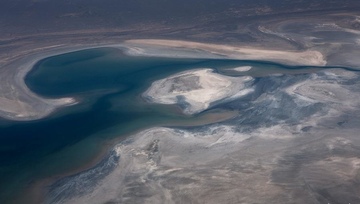Human intervention in nature has caused a lot of environmental problems, however, no disaster is greater than the Aral Sea crisis. The Aral Sea was once the fourth largest lake in the world but it has now shrunk by 97%. Nowadays, the landscape of the Aral Sea looks lifeless, deserted, and alien-like. Schools of fish that once swam here have disappeared forever, and plants don't grow on salty soil.
What caused the disaster?
In the 1960s, the cotton industry and agriculture were actively developing in Uzbekistan and Kazakhstan. The expanding arable lands needed more and more irrigation so the water was taken from the Amudarya and Syrdarya rivers that fed the Aral Sea. As a result, the sea level has dropped dramatically.
By the end of the 1980s, the water level dropped so much that the sea was divided into separate bodies of water: the so-called Greater and Lesser Aral Seas. By 2014, only 10% of the water remained, while the water salinity increased from 14 to 100 grams per liter.
As a result of the disaster, people started to abandon their homes and move elsewhere. At the moment, the population of the Aral Region is about 78,000 people, while 3.5 million people lived there before the disaster.
Why is the Aral Sea worth visiting?
The sea has shrunk leaving behind a desert and decrepit infrastructure. Earlier, you could even see abandoned ships and boats in the middle of the desert. However, many of them were disassembled and taken away. Fun fact: abandoned ships of the Aral Sea are featured in Pink Floyd's «Louder than Words» music video.
The Aral Sea has become an object of dark tourism. This place is picturesque in its own way yet frightening and depressing. Popular destinations include the Aralkum Desert and the Araltuz Industrial Zone, where a large salt mining plant once stood.
The most mysterious object near the Aral Sea is the Vozrozhdeniye Island, where the USSR once conducted biological weapon testing. This once top-secret area is shrouded in rumors and legends.
If you're not into dark tourism, the Aral Sea still has something to offer you. There is the Barsa-Kelmes Nature Reserve, several ancient mausoleums, and even hot springs.

